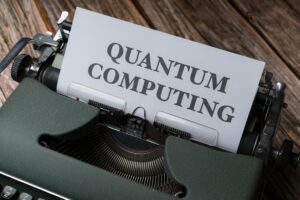Quantum Computing Definitions are crucial. Understanding the fundamental definitions is key to navigating the complex landscape of quantum information processing. In this article, we see the core terms associated with quantum computing, providing clear and concise definitions for both beginners and enthusiasts.
Quantum Computing Definitions

Quantum Bit (Qubit):
A quantum bit, or qubit, is the fundamental unit of quantum information. Unlike classical bits, which can be either 0 or 1, qubits can exist in a superposition of both states simultaneously. This property enables quantum computers to process multiple possibilities in parallel, exponentially increasing their computational capacity.
Entanglement:
Entanglement is a quantum phenomenon where two or more qubits become correlated in such a way that the state of one qubit is directly related to the state of another, regardless of the physical distance between them. Entanglement is a crucial resource in quantum computing, enabling the creation of interconnected quantum systems with unique properties.
Quantum Gate:
A quantum gate is an elementary quantum circuit that performs operations on qubits. These operations include transformations such as flipping the state of a qubit or creating entanglement between qubits. Quantum gates are the building blocks of quantum algorithms, and their precise manipulation is essential for quantum computation.
Superposition:
Superposition is a quantum principle that allows qubits to exist in multiple states simultaneously. While classical bits can be either 0 or 1, a qubit in superposition can be in a combination of both states. Superposition forms the basis for the parallelism inherent in quantum computation.
Quantum Entropy:
Quantum entropy measures the amount of uncertainty or randomness in a quantum system. It is a concept borrowed from classical information theory but adapted to the quantum realm. Quantum entropy provides insights into the distribution of quantum states and is relevant in quantum information processing tasks.
Quantum Algorithm:
A quantum algorithm is a step-by-step set of instructions designed to be executed on a quantum computer. Quantum algorithms leverage the unique properties of qubits, such as superposition and entanglement, to perform computations more efficiently than classical algorithms for certain tasks.
Quantum Supremacy:
Quantum supremacy refers to the point at which a quantum computer can perform a task that is practically impossible for the most powerful classical computers to accomplish within a reasonable amount of time. Achieving quantum supremacy is a significant milestone in the development of quantum computing.

Decoherence:
Decoherence is a phenomenon in quantum systems where the coherence and quantum properties of qubits are lost due to interactions with the external environment. Managing and mitigating decoherence is a critical challenge in the practical implementation of quantum computers.
Quantum Error Correction:
Quantum error correction is a set of techniques and algorithms designed to mitigate errors that naturally occur in quantum computations. Because qubits are sensitive to their environment, errors can arise, and quantum error correction is essential for maintaining the accuracy of quantum computations.
Quantum Cloud Computing:
Quantum Computing Definitions like quantum cloud computing involve providing access to quantum computing resources and services over the internet. Quantum cloud platforms allow researchers, developers, and organizations to remotely access quantum computers for experiments, simulations, and algorithm development.

Conclusion
Quantum Computing Definitions. Navigating the world of quantum computing requires a grasp of these fundamental definitions. From the unique properties of qubits to the principles of superposition and entanglement, each term contributes to the rich tapestry of quantum information processing.
Frequently Asked Questions (FAQs)
What is a qubit in quantum computing?
Ans- A qubit, or quantum bit, is the fundamental unit of quantum information. Unlike classical bits, qubits can exist in a superposition of both 0 and 1 states simultaneously, enabling parallel processing in quantum computers.
What is quantum entanglement in quantum computing?
Ans- Quantum entanglement is a phenomenon where two or more qubits become correlated, and the state of one qubit is directly related to the state of another, regardless of distance. Entanglement is a key resource in quantum computing.
What is a quantum gate in quantum computing?
Ans- A quantum gate is an elementary quantum circuit that performs operations on qubits. These operations include state transformations and the creation of entanglement. Quantum gates are essential building blocks for quantum algorithms.
Learn more https://dencebit.com/quantum-algorithms-for-quantum-dynamics/


28 thoughts on “10 main Quantum Computing Definition: Unravelling the Quantum Roots”